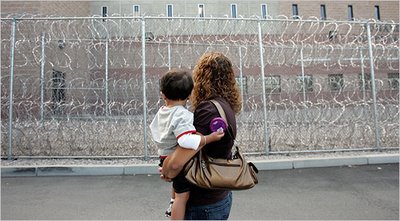How Safe Are You?
In 1850, under pressure from the southern States, the Congress of the United States passed a “Fugitive Slave Act” which enabled slave owners or others acting on their behalf to apprehend fugitive slaves and return them to the south without anything more than a claimant’s sworn testimony of ownership. The individual apprehended (who might not have been a slave after all) had no rights in court. Those aiding a fugitive would themselves be fined and imprisoned.
A major story in today’s New York Times (December 27) makes it evident that we have regressed to the same situation today. People in a small Rhode Island town began disappearing and being shuttled from jail to jail with no information provided to family or friends, no opportunity to appear in court, no way to defend themselves.
Bad enough that the United States has felt free to scoop up individuals who might or might not be terrorists and incarcerate them in Guantanamo Bay and unnamed facilities in Third World countries apart from any legal process, now we do it right here, next door.
The citizens of Central Falls, Rhode Island, borrowed money to build a link in this system on the theory that it would provide income for a struggling community. Instead they find themselves deeper in debt for an ever-expanding facility – and with some of their neighbors inside. A Roman Catholic priest, Hispanic himself, was shocked to find one of his most faithful parishioners inside this facility. But why had neither he nor any of his parishioners or fellow clergy been inside the place before? Have they not read the Gospel: Jesus said, “I was in prison and you did not visit me”?
Is this no longer “the land of the free?” Have we abandoned the rule of law? I am writing my representatives to suggest that, for starters, the law should require that no one (no one) may be incarcerated without notification to someone of their choice and a lawyer.
In one case in the 1850s, a fugitive was brought before a judge with friends there on his behalf. It was late, so the judge sent everyone off to return in the morning for a hearing. When the friends appeared the next day, they discovered that the fugitive and claimant were already heading south. “What happened to the hearing?” the friends asked. “The owner seemed like such an honest man,” said the judge, “I decided no hearing was necessary.”
The laws are there to protect us all. Due process is a minimum requirement. Where there is anyone without rights, we are all in danger, and that danger is not from unknown suspects somewhere in the Middle East but from people in suits and uniforms in Washington and even next door who seem honest but have forgotten why we have a Constitution and a Bill of Rights.

 Christopher L. Webber
Christopher L. Webber